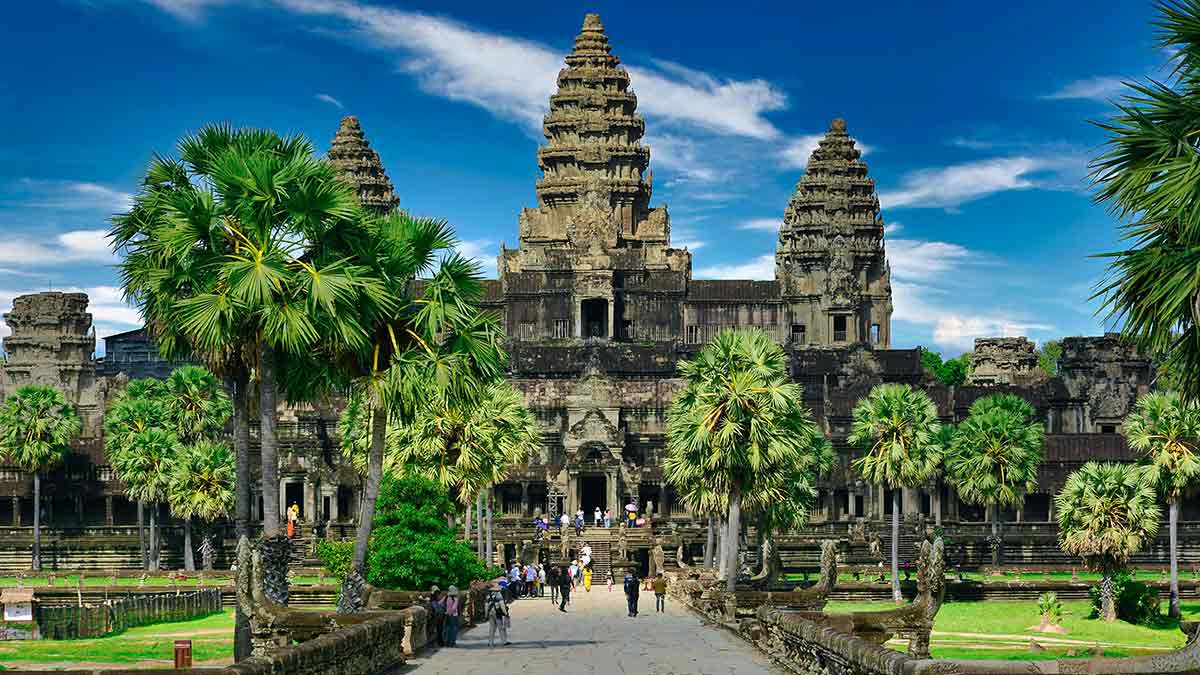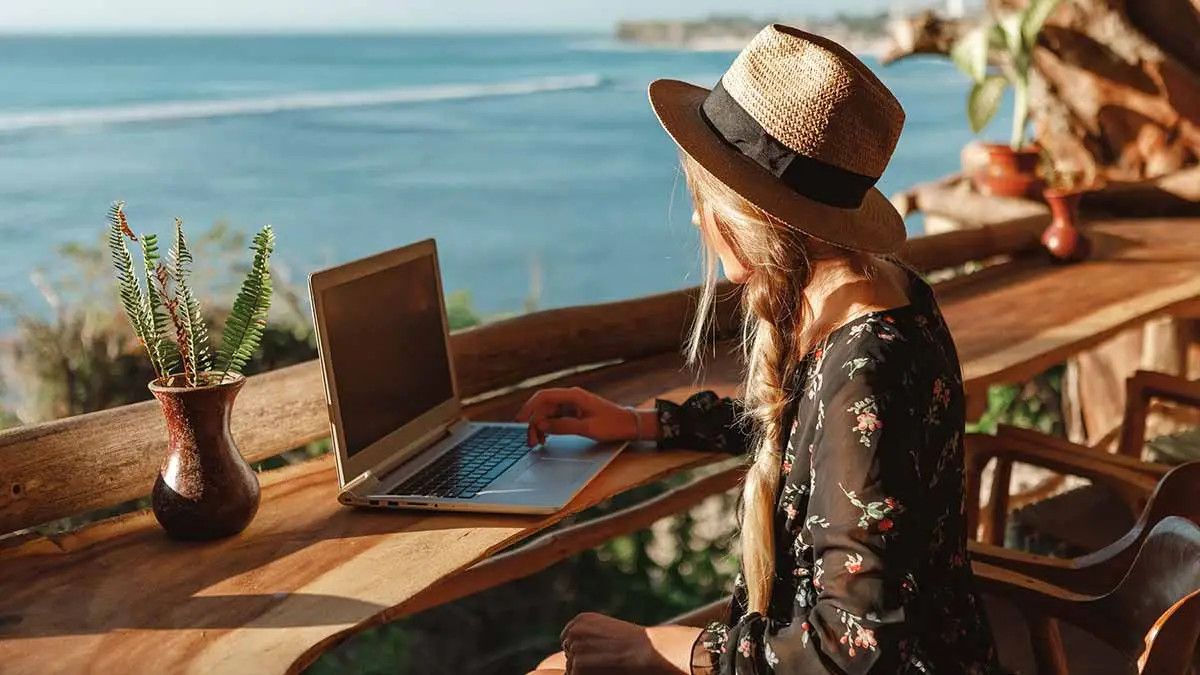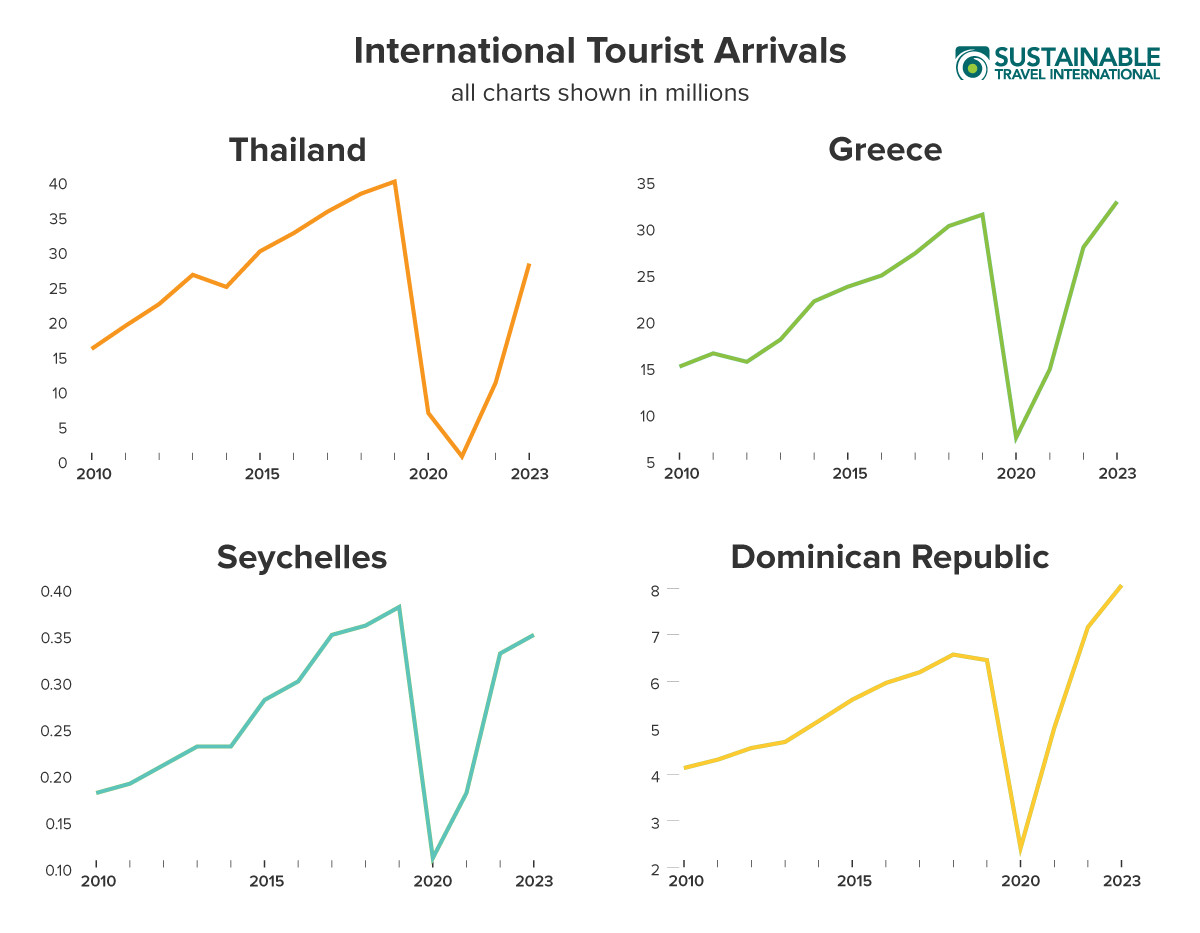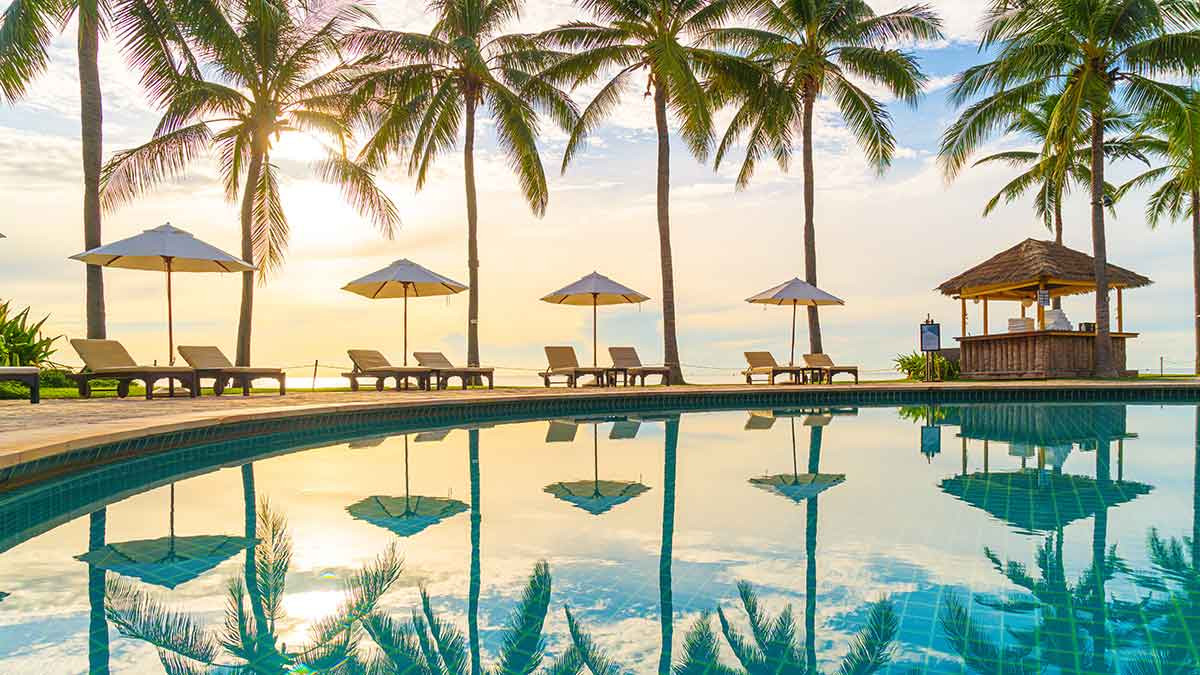Local tourism can boost the economy and promote cultural exchange, but unmanaged growth can harm the environment and local communities. SIXT.VN understands these challenges and offers solutions for sustainable and enjoyable travel experiences in Vietnam. By choosing SIXT.VN, you’re contributing to responsible tourism, ensuring that your visit benefits both you and the local community. Let’s explore the challenges and solutions of overtourism in detail.
1. What is the Issue of Local Tourism and Overtourism?
Overtourism is the main issue of local tourism, occurring when a destination is overwhelmed by too many visitors. This exceeds its capacity to manage them sustainably. This leads to negative impacts such as overcrowding, environmental damage, strained infrastructure, and a decreased quality of life for residents. When the negative effects outweigh the benefits, it’s time to reassess tourism management.
Each destination has a unique carrying capacity influenced by factors like infrastructure, available resources, environmental resilience, physical space, and community perceptions. According to research from the United Nations World Tourism Organization (UNWTO), sustainable tourism balances economic growth with responsible resource management, conservation, visitor enjoyment, and resident satisfaction.
2. What are the Primary Factors Contributing to Local Tourism Challenges?
Several factors exacerbate the issue of local tourism, leading to its challenges:
- Growth of the Global Middle Class: As more people gain disposable income, travel becomes more accessible. According to a Brookings Institution report, the global middle class is expanding rapidly, driving up demand for travel.
- Affordable Travel Options: Cheaper flights and budget-friendly tour packages make travel more accessible. The U.S. Department of Transportation reports that average airfares have decreased over the years, making air travel more affordable.
- Cruise Tourism: The cruise industry’s growth introduces large numbers of tourists to specific ports. Cruise Lines International Association (CLIA) data shows a steady increase in cruise passengers, with projections indicating further growth.
- Short-Term Rentals: Platforms like Airbnb contribute to housing shortages and increased living costs for locals. A study in ScienceDirect showed the disparity between long-term and short-term rental prices, incentivizing property owners to favor the latter.
- Changing Consumer Priorities: Younger generations prioritize experiences over material possessions, driving up travel demand. Hospitality Net reported that younger individuals prefer spending on travel and experiences rather than material goods.
- Social Media Influence: Platforms like Instagram inspire travel, leading to overcrowding at popular spots. According to American Express, a significant percentage of travelers choose destinations based on social media influence.
3. What Are The Negative Impacts of Overtourism on Local Tourism and Communities?
Overtourism significantly impacts local tourism and communities, causing various adverse effects:
- Overcrowding and Congestion: Too many visitors lead to crowded roads, attractions, and public spaces.
- Wear and Tear: Infrastructure and natural sites suffer from accelerated degradation due to heavy use.
- Community Resentment: Locals may feel marginalized as tourism drives up living costs and disrupts their way of life. A recent Skift article highlighted protests in Barcelona and other destinations due to overtourism, with residents chanting “Tourists go home.”
- Resource Competition: Increased demand for water, waste management, and energy strains local resources.
- Environmental Consequences: Ecosystems are damaged to accommodate tourism infrastructure.
 Historical sites are more prone to the impacts of overtourism due to their fragile structures and limited capacity to handle large crowds, risking damage and degradation
Historical sites are more prone to the impacts of overtourism due to their fragile structures and limited capacity to handle large crowds, risking damage and degradation
4. What Can Be Done to Mitigate the Issue of Local Tourism and Overtourism?
Mitigating the issue of local tourism and overtourism requires comprehensive strategies:
- Implement Tourism Management Plans: Destinations need plans that balance economic benefits with environmental sustainability, visitor experience, and community well-being.
- Control Visitor Numbers: Cities like Amsterdam and Dubrovnik have imposed limits on river cruises and cruise ships to reduce congestion.
- Influence Visitor Behavior: Introduce fees and campaigns to promote responsible tourism. Venice has introduced a day-tripper fee to discourage visitation on peak days.
- Disperse Tourists: Promote lesser-known destinations to alleviate pressure on popular sites.
- Engage Local Communities: Ensure that tourism benefits local residents and respects their culture and way of life.
- Regulate Short-Term Rentals: Implement regulations to prevent housing shortages and maintain affordable living for residents.
5. How Can Travelers Help Address the Issue of Local Tourism and Overtourism?
Travelers can play a crucial role in addressing the issue of local tourism and overtourism:
- Stay Informed: Understand the challenges of overtourism and make conscious travel decisions.
- Visit Off-Peak Times: Travel during the low season to avoid crowds.
- Respect Cultural Norms: Be mindful of local customs and traditions.
- Reduce Waste: Minimize your environmental impact by reducing, reusing, and recycling.
- Support Local Businesses: Spend your money at locally-owned establishments to support the community.
- Choose Sustainable Accommodations: Opt for hotels and rentals that prioritize sustainability.
6. What Role Do Tourism Companies Play in Solving the Issue of Local Tourism and Overtourism?
Tourism companies are essential in mitigating overtourism through sustainable practices:
- Offer Tours to Lesser-Visited Destinations: Promote alternative locations to disperse crowds.
- Educate Visitors: Provide information on responsible travel and cultural sensitivity.
- Support Local Communities: Ensure that tourism activities benefit local residents.
- Implement Sustainable Practices: Reduce environmental impact through responsible waste management and energy use.
7. How Can Technology Help Manage Local Tourism and Alleviate Overtourism?
Technology can significantly aid in managing local tourism and alleviating overtourism:
- Visitor Management Systems: Use technology to monitor and control visitor numbers in real-time.
- Smart City Solutions: Implement smart technologies to improve infrastructure and manage resources efficiently.
- Mobile Apps: Develop apps that provide information on less crowded attractions and promote responsible tourism practices.
- Data Analytics: Use data to understand visitor patterns and adjust tourism strategies accordingly.
8. What are Some Examples of Destinations Effectively Managing Local Tourism and Overtourism?
Several destinations have implemented successful strategies to manage tourism:
- Amsterdam: Implemented limits on river cruises and banned new hotel construction.
- Dubrovnik: Capped the number of cruise ships that can dock each day.
- Venice: Introduced a day-tripper fee to discourage peak-day visitation.
- U.S. National Parks: Implemented timed entry permits to control visitor numbers.
 A digital nomad works from a remote destination
A digital nomad works from a remote destination
9. How Does Digital Nomadism Impact Local Tourism and Contribute to Overtourism?
Digital nomadism can exacerbate overtourism by concentrating remote workers in specific locations:
- Increased Demand for Housing: The influx of digital nomads can drive up housing prices, displacing local residents.
- Strain on Infrastructure: Popular digital nomad destinations may struggle to accommodate the increased demand for internet, co-working spaces, and other resources.
- Cultural Conflicts: Differences in lifestyle and spending habits can lead to conflicts with local communities.
10. What are the Long-Term Consequences if Local Tourism and Overtourism Issues are Not Addressed?
If local tourism and overtourism issues are not addressed, the long-term consequences can be severe:
- Environmental Degradation: Continued damage to natural ecosystems and cultural sites.
- Economic Instability: Dependence on tourism can make local economies vulnerable to fluctuations in visitor numbers.
- Social Unrest: Growing resentment among residents can lead to protests and social unrest.
- Loss of Cultural Identity: Local communities may lose their unique identity as they become more tourist-oriented.
- Diminished Visitor Experience: Overcrowding and degradation can make destinations less appealing to visitors, leading to a decline in tourism.
11. Why Choose SIXT.VN for Your Sustainable Travel Needs?
SIXT.VN is dedicated to promoting sustainable tourism in Vietnam by offering services that minimize negative impacts and maximize benefits for local communities.
- Responsible Tourism Practices: We prioritize eco-friendly options and support local initiatives.
- Convenient Services: We offer airport transfers, hotel bookings, and tour packages that make your travel hassle-free.
- Expert Advice: Our team provides guidance on responsible travel and cultural sensitivity.
12. What Services Does SIXT.VN Offer to Help Travelers Explore Vietnam Responsibly?
SIXT.VN offers a range of services designed to help travelers explore Vietnam responsibly:
- Airport Transfers: Reliable and eco-friendly airport transfer services to minimize your carbon footprint.
- Hotel Bookings: A selection of sustainable hotels that prioritize environmental and social responsibility.
- Tour Packages: Curated tour packages that support local communities and promote cultural exchange.
Address: 260 Cau Giay, Hanoi, Vietnam
Hotline/Whatsapp: +84 986 244 358
Website: SIXT.VN
13. How Does SIXT.VN Ensure the Quality and Reliability of its Services?
SIXT.VN ensures the quality and reliability of its services through:
- Careful Selection of Partners: We work with hotels, tour operators, and transportation providers that meet our high standards for sustainability and quality.
- Customer Feedback: We actively seek feedback from our customers to continuously improve our services.
- Expert Team: Our team of travel experts is dedicated to providing exceptional service and support.
14. What are the Benefits of Booking with SIXT.VN Compared to Other Travel Services?
Booking with SIXT.VN offers several benefits compared to other travel services:
- Focus on Sustainability: We prioritize responsible tourism practices.
- Convenience: Our services are designed to make your travel experience seamless and stress-free.
- Local Expertise: We provide insider knowledge and recommendations to help you discover the best of Vietnam.
- Support for Local Communities: We ensure that tourism activities benefit local residents and businesses.
15. How Can You Book Your Sustainable Travel Experience with SIXT.VN?
Booking your sustainable travel experience with SIXT.VN is easy:
- Visit Our Website: Browse our range of services and tour packages at SIXT.VN.
- Contact Us: Reach out to our team via phone or WhatsApp for personalized assistance.
- Book Online: Securely book your airport transfers, hotel bookings, and tour packages online.
 Chart graphs show international tourist arrivals rapid growth in popular destinations
Chart graphs show international tourist arrivals rapid growth in popular destinations
16. What Safety Measures Does SIXT.VN Have in Place to Protect Travelers?
SIXT.VN prioritizes the safety of its travelers by:
- Partnering with Trusted Providers: We work with hotels, tour operators, and transportation providers that adhere to strict safety standards.
- Providing Clear Information: We offer detailed information on safety protocols and travel advisories.
- Offering 24/7 Support: Our team is available around the clock to assist you with any safety concerns.
17. How Does SIXT.VN Support Local Communities Through Its Tourism Services?
SIXT.VN supports local communities through its tourism services by:
- Partnering with Local Businesses: We prioritize working with locally-owned establishments to support the local economy.
- Promoting Cultural Exchange: Our tour packages are designed to facilitate meaningful interactions between travelers and local residents.
- Supporting Local Initiatives: We contribute to local community development projects and initiatives.
18. What Are Some Lesser-Known Destinations in Vietnam That SIXT.VN Recommends?
To help alleviate overtourism, SIXT.VN recommends exploring these lesser-known destinations in Vietnam:
- Ha Giang: Discover stunning landscapes and vibrant ethnic cultures in this northern province.
- Pu Luong Nature Reserve: Explore lush forests, rice terraces, and traditional villages in this hidden gem.
- Phong Nha-Ke Bang National Park: Discover breathtaking caves and diverse ecosystems in this UNESCO World Heritage Site.
19. How Does SIXT.VN Handle Customer Complaints and Ensure Satisfaction?
SIXT.VN is committed to ensuring customer satisfaction by:
- Providing Prompt Responses: We address customer complaints quickly and efficiently.
- Offering Fair Resolutions: We strive to find fair and equitable solutions to customer issues.
- Continuously Improving Services: We use customer feedback to enhance our services and ensure a positive experience for all travelers.
20. What Are Some Upcoming Trends in Sustainable Tourism That SIXT.VN is Embracing?
SIXT.VN is embracing several upcoming trends in sustainable tourism:
- Regenerative Tourism: We are exploring ways to actively contribute to the restoration and enhancement of destinations.
- Community-Based Tourism: We are expanding our partnerships with local communities to offer authentic and immersive experiences.
- Carbon Offsetting: We are providing opportunities for travelers to offset their carbon emissions and support environmental projects.
21. How Does SIXT.VN Address Environmental Concerns Related to Tourism?
SIXT.VN addresses environmental concerns related to tourism through:
- Promoting Eco-Friendly Transportation: We offer electric and hybrid vehicle options for airport transfers and tours.
- Supporting Sustainable Accommodations: We partner with hotels that prioritize energy efficiency, waste reduction, and water conservation.
- Educating Travelers: We provide information on responsible waste disposal, conservation, and minimizing environmental impact.
22. What Cultural Sensitivity Training Does SIXT.VN Provide to its Staff and Partners?
SIXT.VN provides cultural sensitivity training to its staff and partners to:
- Promote Respect for Local Cultures: We emphasize the importance of understanding and respecting local customs, traditions, and values.
- Enhance Communication Skills: We train our staff and partners to communicate effectively and sensitively with travelers from diverse backgrounds.
- Foster Positive Interactions: We aim to create positive and meaningful interactions between travelers and local communities.
23. How Does SIXT.VN Ensure that Tourism Benefits Local Economies in Vietnam?
SIXT.VN ensures that tourism benefits local economies in Vietnam by:
- Prioritizing Local Businesses: We partner with locally-owned hotels, restaurants, and tour operators.
- Creating Employment Opportunities: We provide job opportunities for local residents in our operations.
- Supporting Local Artisans: We promote the purchase of locally-made handicrafts and products.
24. What Measures Does SIXT.VN Take to Prevent Exploitation and Ensure Fair Labor Practices?
SIXT.VN takes the following measures to prevent exploitation and ensure fair labor practices:
- Conducting Due Diligence: We carefully vet our partners to ensure they comply with labor laws and ethical business practices.
- Providing Training and Education: We educate our staff and partners on the importance of fair labor practices and human rights.
- Monitoring and Auditing: We regularly monitor and audit our operations and those of our partners to identify and address any potential issues.
25. What Are the Emerging Trends in Local Tourism and How is SIXT.VN Adapting to Them?
Emerging trends in local tourism include:
- Increased Demand for Authentic Experiences: Travelers are seeking more immersive and meaningful interactions with local cultures.
- Growing Interest in Wellness Tourism: Travelers are prioritizing health and well-being, leading to increased demand for wellness retreats and activities.
- Rise of Solo Travel: More travelers are choosing to travel independently, seeking unique and personalized experiences.
SIXT.VN is adapting to these trends by:
- Offering Authentic Cultural Tours: We provide opportunities for travelers to engage with local communities and experience traditional Vietnamese culture.
- Promoting Wellness Retreats: We partner with wellness centers and resorts to offer rejuvenating and holistic experiences.
- Creating Personalized Itineraries: We offer customized travel plans to meet the unique needs and preferences of solo travelers.
26. How Can You Stay Updated on SIXT.VN’s Sustainable Tourism Initiatives?
Stay updated on SIXT.VN’s sustainable tourism initiatives by:
- Visiting Our Website: Check our website regularly for news and updates on our sustainability efforts.
- Following Us on Social Media: Stay connected with us on social media for the latest news, tips, and inspiration.
- Subscribing to Our Newsletter: Sign up for our newsletter to receive exclusive updates and offers.
27. What Is SIXT.VN Doing to Support Local Communities During the Off-Season?
SIXT.VN supports local communities during the off-season by:
- Promoting Off-Season Travel: We encourage travelers to visit Vietnam during the low season to support local businesses year-round.
- Creating Special Offers: We offer discounted rates and special packages to attract visitors during the off-season.
- Organizing Community Events: We organize community events and initiatives to support local residents during the off-season.
 Large resort pools require lots of water and can cause water shortages in overtouristed destinations
Large resort pools require lots of water and can cause water shortages in overtouristed destinations
28. How Does SIXT.VN Measure the Impact of Its Sustainable Tourism Efforts?
SIXT.VN measures the impact of its sustainable tourism efforts by:
- Tracking Environmental Indicators: We monitor key environmental indicators such as energy consumption, waste generation, and water usage.
- Assessing Economic Benefits: We assess the economic benefits to local communities through job creation, revenue generation, and support for local businesses.
- Gathering Community Feedback: We actively seek feedback from local communities to understand their perspectives and ensure that our initiatives are aligned with their needs.
29. What Advice Does SIXT.VN Have for First-Time Travelers to Vietnam Looking to Travel Responsibly?
SIXT.VN’s advice for first-time travelers to Vietnam looking to travel responsibly includes:
- Do Your Research: Learn about Vietnamese culture, customs, and traditions before you go.
- Support Local Businesses: Shop at locally-owned stores, eat at local restaurants, and use local services.
- Be Mindful of Your Impact: Reduce your environmental footprint by conserving water, reducing waste, and using eco-friendly transportation.
- Respect Local Cultures: Be respectful of local customs and traditions, and dress modestly when visiting temples and religious sites.
- Engage with Local Communities: Take the time to interact with local residents, learn about their lives, and share your experiences.
30. What Future Plans Does SIXT.VN Have for Promoting Sustainable Tourism in Vietnam?
SIXT.VN’s future plans for promoting sustainable tourism in Vietnam include:
- Expanding Partnerships with Local Communities: We plan to forge even stronger partnerships with local communities to offer more authentic and immersive experiences.
- Investing in Eco-Friendly Infrastructure: We are committed to investing in eco-friendly transportation options and accommodations.
- Launching New Sustainable Tourism Initiatives: We will continue to develop and launch innovative initiatives to promote responsible travel and conservation.
31. What Are the Legal Considerations for Local Tourism and How Does SIXT.VN Ensure Compliance?
Legal considerations for local tourism include regulations related to environmental protection, labor practices, and consumer rights. SIXT.VN ensures compliance by:
- Staying Informed: We stay up-to-date on the latest laws and regulations related to tourism in Vietnam.
- Seeking Expert Advice: We consult with legal experts to ensure that our operations comply with all applicable laws and regulations.
- Conducting Regular Audits: We conduct regular audits to identify and address any potential compliance issues.
32. How Can Educational Programs Help With Issues in Local Tourism?
Educational programs play a crucial role in addressing issues in local tourism by:
- Raising Awareness: They educate both tourists and locals about the importance of responsible travel and conservation.
- Promoting Cultural Sensitivity: They teach travelers how to respect local cultures and traditions.
- Developing Skills: They provide training and education to local communities to help them benefit from tourism in a sustainable way.
33. What are the Different Types of Local Tourism and How Do They Impact the Community?
Different types of local tourism include:
- Cultural Tourism: Focuses on experiencing local cultures, traditions, and heritage.
- Ecotourism: Emphasizes responsible travel to natural areas, conserving the environment, and improving the well-being of local people.
- Adventure Tourism: Involves challenging outdoor activities such as hiking, climbing, and rafting.
- Medical Tourism: Involves traveling to another country for medical treatment.
Each type of tourism has different impacts on the community:
- Cultural Tourism: Can help preserve and promote local cultures, but can also lead to commodification and cultural appropriation.
- Ecotourism: Can help protect the environment and support local communities, but can also lead to environmental damage if not managed properly.
- Adventure Tourism: Can provide economic benefits to local communities, but can also lead to environmental damage and safety concerns.
- Medical Tourism: Can provide access to affordable healthcare, but can also strain local healthcare resources.
34. How Can Government Policies Help Manage and Improve Local Tourism Issues?
Government policies can play a crucial role in managing and improving local tourism issues by:
- Setting Limits on Visitor Numbers: Implementing quotas or permits to control the number of tourists visiting a destination.
- Implementing Zoning Regulations: Designating specific areas for tourism development to protect natural and cultural resources.
- Investing in Infrastructure: Improving transportation, water, and waste management systems to support tourism.
- Promoting Sustainable Practices: Providing incentives for tourism businesses to adopt sustainable practices.
- Enforcing Regulations: Ensuring that tourism businesses comply with environmental and labor laws.
35. How Does Climate Change Affect Local Tourism?
Climate change poses significant challenges to local tourism by:
- Damaging Natural Attractions: Rising sea levels, extreme weather events, and changing ecosystems can damage beaches, forests, and other natural attractions.
- Disrupting Travel Patterns: Extreme weather events can disrupt travel patterns and force the closure of tourist destinations.
- Reducing Water Availability: Climate change can lead to droughts and water shortages, impacting tourism-related activities such as golf and swimming.
- Increasing Health Risks: Rising temperatures and changing disease patterns can increase health risks for tourists.
To address these challenges, destinations need to:
- Reduce Greenhouse Gas Emissions: Implement policies to reduce greenhouse gas emissions from tourism-related activities.
- Adapt to Climate Change: Invest in infrastructure and practices that can help tourism destinations adapt to the impacts of climate change.
- Promote Sustainable Tourism Practices: Encourage tourism businesses to adopt sustainable practices that minimize their environmental impact.
36. What is the Role of Technology in the Future of Local Tourism?
Technology will play a transformative role in the future of local tourism by:
- Personalizing Travel Experiences: Technology can be used to personalize travel experiences based on individual preferences and interests.
- Improving Efficiency: Technology can help streamline tourism operations and improve efficiency.
- Enhancing Communication: Technology can facilitate communication between tourists, tourism businesses, and local communities.
- Promoting Sustainable Practices: Technology can be used to monitor and reduce the environmental impact of tourism.
37. What Are the Challenges and Benefits of Using Artificial Intelligence in Local Tourism?
Challenges of using AI in local tourism include:
- Data Privacy Concerns: AI relies on large amounts of data, raising concerns about data privacy and security.
- Bias and Discrimination: AI algorithms can be biased, leading to discriminatory outcomes.
- Lack of Human Touch: AI-powered systems may lack the human touch and empathy that tourists value.
Benefits of using AI in local tourism include:
- Personalized Recommendations: AI can provide personalized recommendations for hotels, restaurants, and activities.
- Improved Customer Service: AI-powered chatbots can provide instant customer service.
- Predictive Analytics: AI can be used to predict tourist demand and optimize resource allocation.
38. How Can Virtual Reality Enhance Local Tourism Experiences?
Virtual reality (VR) can enhance local tourism experiences by:
- Providing Virtual Tours: VR can allow tourists to virtually visit destinations before they travel, helping them plan their trips.
- Creating Immersive Experiences: VR can create immersive experiences that bring local cultures and traditions to life.
- Preserving Cultural Heritage: VR can be used to preserve and showcase cultural heritage sites that are at risk of damage or destruction.
39. What Are the Best Practices for Marketing Local Tourism Sustainably?
Best practices for marketing local tourism sustainably include:
- Targeting Responsible Tourists: Focus on attracting tourists who are interested in sustainable and responsible travel.
- Highlighting Local Culture: Showcase local cultures and traditions to attract tourists who are interested in authentic experiences.
- Promoting Off-Season Travel: Encourage tourists to visit during the off-season to support local businesses year-round.
- Communicating Sustainability Efforts: Highlight the sustainability efforts of tourism businesses and destinations.
- Using Sustainable Marketing Materials: Use eco-friendly materials and practices for marketing materials.
40. What Are the Key Performance Indicators (KPIs) for Measuring the Success of Sustainable Local Tourism Initiatives?
Key performance indicators (KPIs) for measuring the success of sustainable local tourism initiatives include:
- Tourist Satisfaction: Measure tourist satisfaction with the overall experience.
- Local Community Well-Being: Assess the impact of tourism on the well-being of local communities.
- Environmental Impact: Monitor key environmental indicators such as energy consumption, waste generation, and water usage.
- Economic Benefits: Track the economic benefits to local communities through job creation, revenue generation, and support for local businesses.
SIXT.VN is committed to addressing the issue of local tourism and overtourism by promoting sustainable practices and supporting local communities. By choosing SIXT.VN for your travel needs in Vietnam, you can contribute to a more responsible and enjoyable tourism experience. Contact us today to learn more about our services and how you can make a difference.



